Vitamin B12 is best known for its role in energy production and its potential for deficiency in vegan or vegetarian diets.
However, Vitamin B12 supplementation has become popular across all dietary philosophies, including meat-based or omnivorous diets.
So, why are so many people taking B12 supplements?
This is partly due to new information about B12 deficiency, which is much more widespread than initially thought.
It’s also due to a greater understanding of the benefits of optimal B12 levels beyond just energy and preventing anemia.
Although B12 supplementation is not for everyone, understanding the benefits of B12, symptoms of deficiency, optimal forms and delivery systems, and how to ensure you’re getting enough is essential.
What is Vitamin B12?
Vitamin B12, also known as cobalamin, is an essential nutrient* belonging to the B-vitamin family.
*Essential nutrients are those your body cannot make on its own and are, therefore, essential to consume from foods, beverages, or supplements.
Vitamin B12 is a water-soluble vitamin, meaning excess is excreted and does not build up in the body like fat-soluble vitamins.
Vitamin B12 is found primarily in animal products such as meats, organ meats, eggs, dairy, fish, and seafood. Therefore, supplementation is often recommended for vegans and vegetarians who may be more prone to dietary deficiency or insufficiency.
However, B12 deficiency is no longer just a vegan or vegetarian issue, so checking your levels is wise.
We’ll discuss what’s causing B12 deficiencies in meat eaters and vegetarians/vegans next.
Is Vitamin B12 Deficiency Common (and What’s Causing it)?
It was once believed that most people got plenty of B12 from meats and animal products.
However, new research has shown up to 26% of the global population is deficient in B12, not just vegetarians and vegans.
This doesn’t account for those with insufficient or suboptimal B12 levels, which indicate a trend toward deficiency and may cause symptoms.
The big takeaway is that eating meat or animal products does not guarantee optimal B12 levels.
6 Potential Causes Of Vitamin B12 Deficiency
So, how can someone who eats B12-rich foods every day become deficient?
That’s a fair question.
The answer is it depends on how you absorb and metabolize Vitamin B12, which can be affected by many factors, including:
- Age: Our ability to store B12 diminishes as we age, with studies showing adults over 50 having higher rates of deficiency
- Certain autoimmune conditions, such as Celiac or Crohn’s Disease
- Digestive or gut health issues such as intestinal permeability (aka: leaky gut) or lack of hydrochloric acid
- Genetic variations, such as MTHFR and others
- Certain medications, such as birth control pills, diabetes medication, or proton pump inhibitors
- Thyroid health issues
To be clear, a lack of dietary B12 is still a significant risk factor for B12 deficiency, but it’s no longer considered the only or even the primary risk factor.
24 Symptoms of B12 Deficiency
B12 deficiency or insufficiency can sneak up on a person for several reasons, including:
- Lack of screening at annual physicals
- The belief it’s only a problem for vegans and vegetarians
- Strange symptoms that may be mistaken for other ailments
- Lack of symptoms, which can often take years to show up
In addition, B12 deficiency, like iron deficiency, can be difficult to detect in lab work due to the body’s ability to store B12, which can create the appearance of adequate consumption, absorption, and levels.
This is why understanding the symptoms of B12 deficiency is essential.
The following are 24 symptoms of potential B12 deficiency:
Note: Remember, these aren’t always caused by a deficiency and could be a sign of another health issue. Always talk to your doctor about any symptoms.
- Cognitive health issues, including poor memory and brain fog
- Depression, anxiety, personality disorders, or mood swings
- Digestive problems, such as diarrhea
- Frequent colds or compromised immunity
- Fatigue, mild, moderate, or extreme
- Fertility issues
- Pregnancy issues
- Muscle cramping or weakness
- Blood sugar or metabolic issues
- Nervous system issues
- Tingly sensations in hands and feet
- Breathlessness
- Mouth or tongue soreness or smooth tongue
- Nervous system ailments or damage
- Brittle hair or nails
- Premature graying of hair
- Skin issues
- Sleep issues
- Heart palpitations
- Pale or jaundiced skin
- Loss of appetite
- Trouble walking
- Weight loss
- Blurry vision and other eye issues
Again, although B12 deficiency may not always cause these symptoms, given the prevalence of deficiency, it is wise to have your levels checked.
23 Benefits of B12 Optimization
Since B12 is an essential vitamin, the benefits of consuming and absorbing enough cannot be understated.
Specifically, optimal B12 levels benefit:
- Appetite
- Blood health
- Blood sugar and metabolic function
- Brain health
- Cardiovascular function
- Cellular health
- Digestion
- Energy levels
- Eye health
- Fetal development
- Focus and concentration
- Hair, skin, and nails
- Hormonal health
- Immune function
- Longevity
- Nervous system function
- Mental/emotional well-being
- Pregnancy
- Reproductive function
- Sleep
- Stamina
- Thyroid function
- Weight
Conversely, severe B12 deficiency can cause permanent damage to organs and systems or even death if left unchecked.
There are many benefits to optimal B12 levels. Plus, as a water-soluble vitamin, there is little risk of getting too much, which suggests erring on the side of more versus less for optimal health.
How Much Vitamin B12 Do You Need?
Since every person has different genetic variations, health issues, digestive health function, nutritional philosophies, age, and genetics, every person’s B12 needs are unique.
For example, a pregnant woman in her late thirties with an MTHFR genetic variation who takes proton pump inhibitors, has Celiac, and is vegan probably will have much greater B12 requirements than a person in their twenties, who is not pregnant, does not have a genetic variation that impacts B12 absorption, does not have Celiac, takes no medication, and eats meat.
Therefore, check with your healthcare practitioner about the optimal amount of Vitamin B12 for you or your family members specifically.
The NIH offers these baseline recommended daily allowances:
|
Age |
Male |
Female |
Pregnancy |
Lactation |
|
Birth to 6 months* |
0.4 mcg |
0.4 mcg |
|
|
|
7–12 months* |
0.5 mcg |
0.5 mcg |
|
|
|
1–3 years |
0.9 mcg |
0.9 mcg |
|
|
|
4–8 years |
1.2 mcg |
1.2 mcg |
|
|
|
9–13 years |
1.8 mcg |
1.8 mcg |
|
|
|
14–18 years |
2.4 mcg |
2.4 mcg |
2.6 mcg |
2.8 mcg |
|
19+ years |
2.4 mcg |
2.4 mcg |
2.6 mcg |
2.8 mcg |
How To Increase Vitamin B12 Levels Naturally Using Food & Supplements
Whole foods are always the best sources of essential vitamins, minerals, and nutrients, including Vitamin B12.
However, supplementation with the appropriate form and delivery system of B12 can be life-changing for those with deficiencies, genetic variations, absorption issues, pre-existing conditions, or those who do not get enough from foods like animal products.
The Best Food Sources of B12
As mentioned previously, the best source of Vitamin B12 is whole, B12-rich foods, including:
- Organ meats, such as liver
- Red meats
- Poultry
- Fish and seafood
- Dairy products
- Eggs
What About Plant-Based Sources of Vitamin B12?
Vitamin B12 does exist in minimal amounts in certain plant-based foods, including:
- Nutritional yeast
- Fermented soy products, such as tempeh, may contain small amounts
- Fortified cereals, grains, and dairy-free milks
Your healthcare practitioner may recommend a supplement if you cannot get enough B12 from foods or have absorption issues.
The Best B12 Supplements (it’s not a one-size-fits-all)
Finding the best B12 supplement to prevent deficiency and optimize health can take some detective work.
Fortunately, new research has helped inform healthcare practitioners and the general public about the benefits of specific forms and delivery systems of B12 for people with genetic variations, pre-existing conditions, or those with absorption issues.
What Form of B12 Supplement Is Right For You?
Vitamin B12 supplements generally come in four forms:
- Cyanocobalamin (most common)
- Methylcobalamin (commonly recommended by integrative practitioners)
- Adenosylcobalamin
- Hydroxocobalamin
They are available in various delivery systems, including:
B12 may also be included in multivitamins or B-complex supplements.
If you’re otherwise healthy with no genetic variations that impact B12 metabolism, then any form in any delivery system will work. In this case, cyanocobalamin is typically recommended.
If you have a pre-existing autoimmune condition, gut health issues, or genetic variations, methylcobalamin and/or Adenosylcobalamin will likely be recommended for maximum absorption.
Although the science on optimal delivery systems is mixed, some evidence suggests lozenges or liquids may be better absorbed than capsules.
As always, check with your healthcare practitioner for individual recommendations.
Is Taking B Complex or Multivitamins Enough?
If you’re already taking a B Complex or Multivitamin, you may not need additional B12 supplementation.
Check the amount and form of B12 on the label and talk to your healthcare practitioner for individual recommendations.
Let Country Life Help You Optimize Your B12 Levels
Country Life has been making and manufacturing clean, gluten-free, non-GMO, vegan, Vitamin B12 supplements in our Certified Organic facilities for decades.
We understand there is no one-size-fits-all for Vitamin B12 supplementation, which is why we offer a variety of options, including methylcobalamin and cyanocobalamin in capsules, lozenges, and gummies.
Shop Country Life’s Vitamin B12 supplements here.
Knowledge is power when understanding your body, its symptoms, and your unique nutritional needs.
We hope this article has helped empower you with the information you need about the benefits of B12 and how to identify potential symptoms of deficiency so you can take steps to prevent and address it.
If you think you may benefit from supplemental B12, consult your healthcare practitioner for individual recommendations.
Learn More About the Benefits of B12 and B Vitamins in:
Sources mentioned in this article:
- “Vitamin B12 Deficiency”. Nature Reviews Disease Primers.
- “Vitamin B12 Fact Sheet for Health Professionals”. National Institutes of Health Office for Dietary Supplements.
- “Correlation Between Vitamin B12 Deficiency and Autoimmune Thyroid Diseases”. Endocrine, Metabolic, and Immune Disorders Drug Targets.
- “Vitamin B12 Deficiency”. StatPearls. Internet.
- “Are you getting enough B12?” Harvard Health.
- “Small Intestinal Bacterial Overgrowth: Comprehensive Review of Diagnosis, Prevention, and Treatment Methods”. Cureus.
- Genetic Variants Associated With Vitamin B12”. Harvard School of Public Health.
- “How Birth Control Pills Affect Your Nutritional Needs”. Scientific American.
- “Association between metformin dose and vitamin B12 deficiency in patients with type 2 diabetes”. Medicine (Baltimore).
- “Proton Pump Inhibitor and Histamine 2 Receptor Antagonist Use and Vitamin B12 Deficiency”. JAMA.
- “Vitamin B12 Deficiency”. StatPearls. Internet.
- “Vitamin B12 Benefits and Best Sources”. The Cleveland Clinic.
- “Female Fertility and the Nutritional Approach: The Most Essential Aspects”. Adv Nutr.
- “Maternal vitamin B12 in pregnancy and risk of preterm birth and low birth weight: A systematic review and individual participant data meta-analysis”. American Journal of Epidemiology.
- “Serum vitamin B12 levels and glycemic fluctuation in patients with type 2 diabetes mellitus”. Therapeutic Advances in Endocrinology and Metabolism.


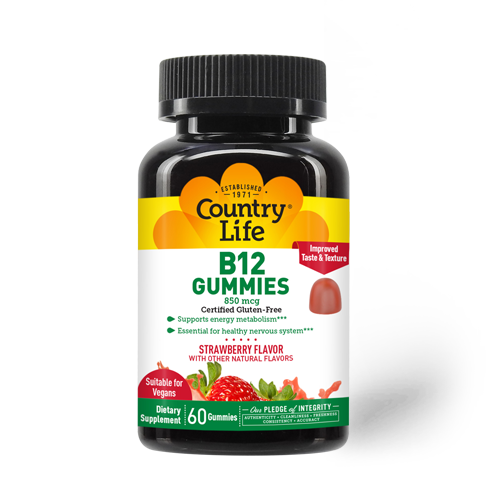
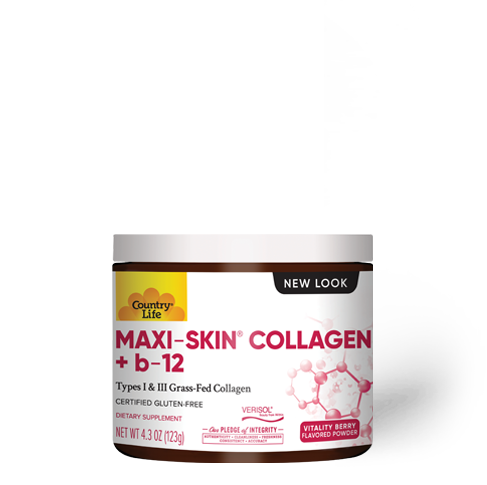
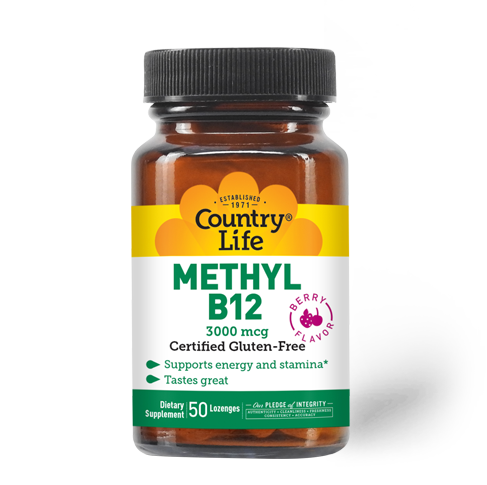
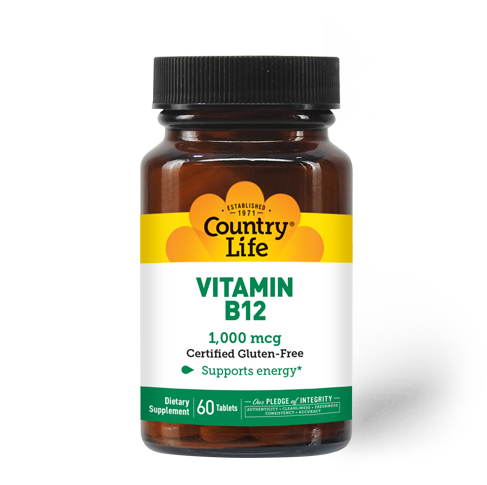
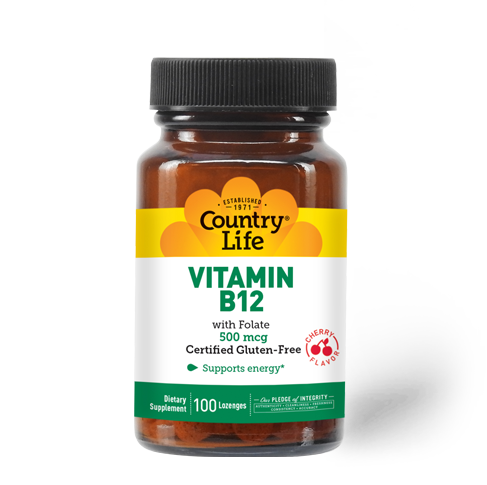










Share:
20+ Food & Supplement Sources of Iron for Omnivores, Vegans, & Everyone in Between
How Does L-Theanine Work for and Support Relaxation?